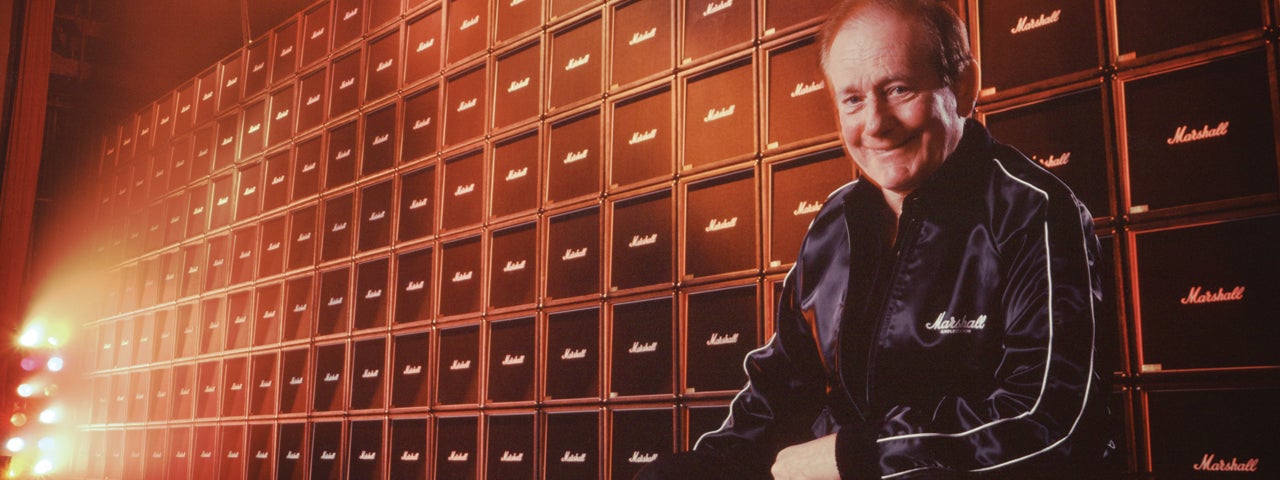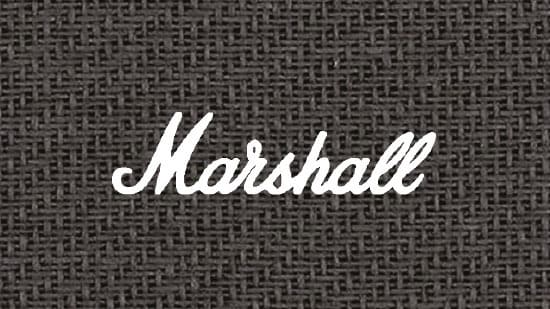Marshall Law
Can a 60-year-old guitar amp company change the music industry? This one thinks so…
The SXSW festival in Austin, Texas is a cutting-edge convergence of tech, film, music, education and culture. It’s a place where Web3, NFTs and AI are openly discussed – and for the most part, understood. It’s not a backdrop for ageing rockers seeking ’60s psychedelia, so what is a vintage guitar amp company doing here?
Attempting to change the music industry, as it turns out. Marshall is a name that’s been synonymous with rock and roll superstardom since the early days of Jimi Hendrix. Founded by London drum shop owner Jim Marshall in 1962, it has created crazy loud amps with a sought-after sizzling distortion and crunch ever since. Marshall stacks producing the world-renowned ‘Marshall sound’ support the biggest bands on the biggest stages, which isn’t bad for a company of fewer than 200 employees that’s located on a nondescript British industrial estate.
But enough looking back, because this is a brand that’s moving the dial… to 11 (yes, that’s a Marshall amp in the famous Spinal Tap scene). It starts with nurturing diverse new artists by handing them the equipment to reach their potential and paying them properly in the process.
Peeling off the label
Marshall Records is home to an eclectic roster of aspiring cross-genre artists, where the schoolkid anti-establishment punk of Gen and the Degenerates and Noah and the Loners meets reflective pop, trap metal grime and more. Its most high-profile signing yet, Nova Twins, are a British black female rock duo of Iranian, Nigerian, Jamaican and Australian descent who were nominated for the coveted Mercury Prize last year and played Glastonbury’s huge Other Stage this year.
But what really makes Marshall Records different is the royalties it pays compared to major labels. With so much disposable music dominating streaming platforms, it’s attempting to hone the craft and longevity of its grassroots stars by offering them iconic equipment, a state-of-the-art studio to record in and even support on tour by developing the careers of crew and promoters too.
“We have a very artist-friendly policy where we pay royalties of 75% off the bat. Most labels are paying 50% with long retentions on master rights,” Marshall Amplification music director Steve Tannett explains. “We’re much more interested in helping them on their journey and, if they want to stay, we’re happy to have them.
“We’re not restrictive on any part of what we do. We don’t insist on taking music publishing rights, for instance. Everything we do is aimed towards the artists because we feel the players of the future come from considered development and they’re hopefully going to grow up to be great Marshall users.”
“The best part about a non-conforming type of label, where the precedent isn’t just trying to be this manufactured masquerader, is you get to put your heart and soul into rock and roll and the music that runs through your veins,” grime artist Kid Bookie says. “I was on the borderline of desperation and I didn’t know I wanted a label, but Marshall had this forensic nature of asking ‘Who really are you?’, so you learn about yourself and that’s when you push boundaries and push buttons.
“It’s the reason why we do this, you know, the working-class punk s***. It’s not from nepotism, it’s from working hard under pressure and that synergy with Marshall is everywhere. You put that ethos towards that nature and you’ve got a cataclysm of controlled madness and they work well with organised chaos because that’s the true essence of what rock and roll is.”
Studio time
Located at the company HQ in Milton Keynes, the Marshall Studio features a live room that’s large enough for a 250-person gig. Stacks of unique equipment meet countless mod cons and, in a nod to the company’s origins, the space is inspired by Jim Marshall’s original drum shop where creative conversations with rock stars like The Who’s Pete Townshend flourished.
It’s also here where the recently formed Marshall Live Agency is helping crews and promoters of the future after the devastating impacts that the 2007/08 financial crash and COVID-19 had on the scene. “I’ve been in the industry for 15 years and, quite often, agent performance is measured by fees generated,” says Stuart Vallans, head of Marshall Live Agency. “Marshall has thrown that out the window; it’s not how they do business. The Agency performance will be based on how many people we inspire to see live music. It’s incredible to be backed to do the right thing and put the needs of artists and venues first.”
“What we’ve done with the record label has allowed us to build a recording studio we think is one of the very best in England,” adds Tannett. “With our recording facilities and the Marshall Live Agency, we’ve been able to form a community around artists so we can offer them something different to other record companies.”
Diversification in action
It’s no secret that the music industry has suffered its fair share of setbacks, so how can Marshall afford all of this? Through a thriving headphone and speaker business.
“Jim [Marshall] passed away in 2012 and the company wasn’t in the best situation. The financial crash of 2007/08 impacted the music industry about five years later, so we had to diversify the business,” Alex Coombes, managing director of Marshall Amplification, explains.
“We started making consumer headphones and speakers, which became immensely successful, and we were able to reinvest that into the music business. We found ourselves in a privileged position and asked how we could give something back. We’re lucky. We make a profit, we’re not servicing debt, so let’s do the right thing. Obviously, we get two bites of the cherry if artists are seen using our products, but we’ve never paid anyone to do so. People ask us all the time. Well, guess what? We never paid Slash or any of those guys to use our amps.”
The new-look Marshall also supports initiatives like the non-profit Women in Vinyl. The aim is to educate and empower women, female-identifying, non-binary, LGBTQ+, BIPOC and otherwise marginalised people working in the industry to create, preserve and improve the art of music on vinyl. By funding internship programmes, education and access to exclusive events, it’s hoped that the next generation of producers, engineers and even record store owners will emerge.
“The Marshall of the past was all about rock and metal and it was quite a white male-dominated industry,” says Coombes. “What we’re trying to do today is learn from that and push boundaries. Some of the opportunities we’re getting to work with trans artists, for example, are huge and we’re trying to educate people that you can be anything you want to be.
“That’s why Nova Twins came to us – because they wanted to change perceptions. That’s massively important for other record labels to hear when stories surface about albums being buried because it doesn’t suit the needs of the A&R guys.”
“This ethos wasn’t there back in the ’80s and ’90s. It was a different business,” adds Tannett. “I look to the music scene today for diversity. A lot of people in the industry still struggle to understand it and say: ‘That’s not how we do things.’ Well, that’s how Marshall does things. Hopefully, it will make a difference.”
Picture credit: Marshall

 Can a 60-year-old guitar amp company change the music industry? This one thinks so…
Can a 60-year-old guitar amp company change the music industry? This one thinks so…

